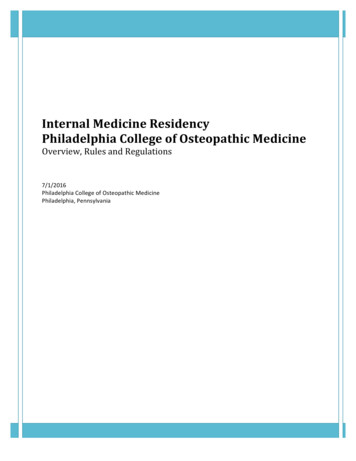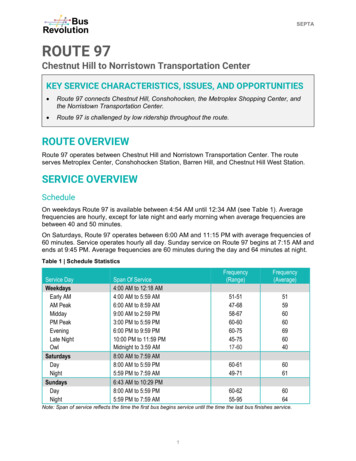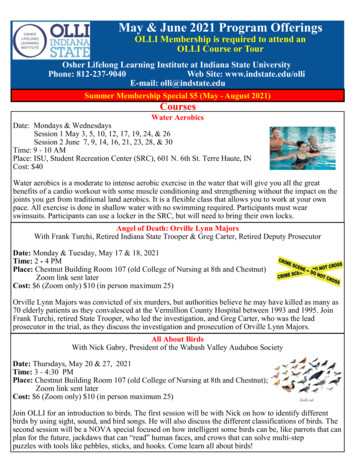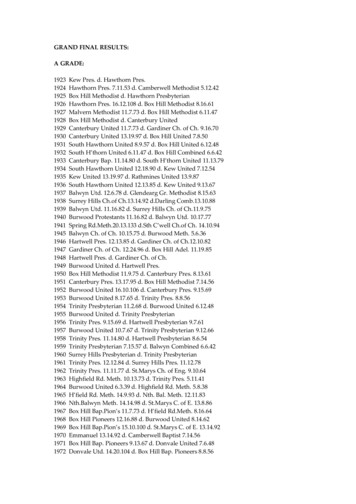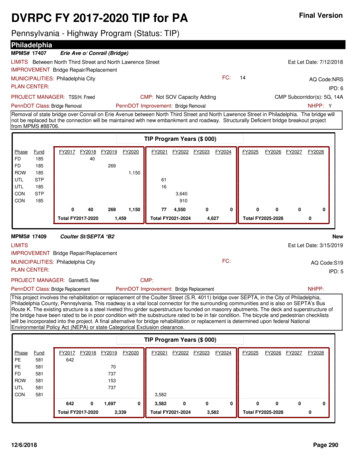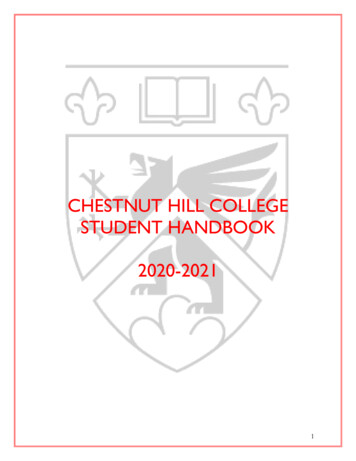
Transcription
CHESTNUT HILL COLLEGESTUDENT HANDBOOK2020-20211
Policies and procedures contained in the Chestnut Hill College Student Handbook are accurateat the time of its publication and is based upon current knowledge and guidance from federal,state, and local officials. This document and the policies contained herein are subject to change.Updates will be made and communicated to members of the Chestnut Hill College communityvia their @chc.edu email address and on the College website.Please note that the 2020-2021 Student Handbook contains policies related to the COVID-19global pandemic. The COVID-19 pandemic continues to rapidly evolve and therefore theguidance and best practices are frequently changed. Guidance from the CDC and requirementsset forth by the City of Philadelphia and Commonwealth of Pennsylvania will continue to informthe policies contained in this document.2
TABLE OF CONTENTSMISSION STATEMENT OF CHESTNUT HILL COLLEGE. 4HISTORY OF CHESTNUT HILL COLLEGE . 5STUDENT CODE OF CONDUCT . 8STUDENT LIFE POLICIES . 14POLICY ON SEX DISCRIMINATION, SEXUAL HARASSMENT AND SEXUAL VIOLENCE . 22SUBSTANCE ABUSE POLICY . 47OFFICE OF RESIDENCE LIFE . . . 43COLLEGE FACILITIES . 87STUDENT GOVERNMENT ASSOCIATION . 89STUDENT ACTIVITIES . 90ATHLETICS . 90STUDENT LIFE SERVICES . 91VEHICLE REGISTRATION . 973
Mission Statement of Chestnut Hill CollegeThe Mission of Chestnut Hill College is to provide students with holistic educationin an inclusive Catholic community marked by academic excellence, sharedresponsibility, personal and professional growth, service to one another, to theglobal community, and concern for the earth.Chestnut Hill College, founded by the Sisters of Saint Joseph in 1924, is an independent,Catholic institution that fosters equality through education. Faithful to its strong liberal artstradition, Chestnut Hill College offers academic programs of excellence in the area ofundergraduate, graduate, and continuing studies.True to its Catholic heritage, Chestnut Hill College espouses the beliefs and values inherent inthe Judeo-Christian tradition while it respects the contributions made by other faith traditionsin the development of the whole person. The College nurtures a sense of integrity, spirituality,and social justice in all.The College community dedicates itself to four purposes in fulfilling this mission. It seeks 1. to provide avenues for students to achieve academic excellence and to pursue researchin their major field or in interdisciplinary studies. The College encourages students toexplore and experience diverse curricula and to participate in exchange programs withother institutions of higher education.2. to initiate links between the world of learning and the world of work through curricularplanning, technological opportunities, and career preparation. The College guidesstudents in applying theoretical learning through experiential learning designedcollectively by faculty and students.3. to uphold an atmosphere of communal respect in which all may clarify and articulatepersonal values and beliefs while exploring the ethical and moral dimensions underlyingall relationships. The College encourages inter-faith opportunities by acquainting allstudents with Catholicism, its theology and its Judeo-Christian roots, and by engaging indialogue with women and men of other beliefs.4. to create local and global connections that enable students to respond to the needs ofothers through service-oriented enterprises. The College educates students to identifyand to address issues of social justice and to work toward systemic change.In this spirit, and with a commitment to life-long learning, the Chestnut Hill College communityhas adopted these learning outcomes to promote, guide and assess learning in all the College’sprograms. While addressing students, the College’s founder, Sister Maria Kostka Logue, oncefamously remarked that “Chestnut Hill will prepare you to learn how to earn a living becauseyou must. But you are here to learn how to live.” Embracing this belief, we set forth theseoutcomes as standards in all academic and co-curricular areas.4
Information LiteracyCommunicationCritical and Creative InquiryLeadership and CollaborationIntegrative LearningCivic Responsibility and PracticeEthical ResponsibilityKnowledge of Self and OthersIntentional LearningSpiritual GrowthHistory of Chestnut Hill CollegeLocated at the northwestern edge of Philadelphia on 45 acres overlooking the WissahickonCreek, Chestnut Hill College opened in 1924 as a Catholic, four-year, liberal arts College forwomen. Founded as Mount Saint Joseph College by the Sisters of Saint Joseph, the College wasrenamed in 1938 as Chestnut Hill College.Since its inception, the College has offered a rigorous liberal arts education that providesstudents with a broad background in the humanities, social sciences and natural sciences. Thegoal of Chestnut Hill College has been to prepare students for life’s challenges by helping themto grow intellectually, spiritually, emotionally and socially.In keeping with the spirit of the Sisters of Saint Joseph, the curriculum has been modified overtime to meet the ever-changing needs of higher education and society. The College originallyawarded only the Bachelor of Arts and Bachelor of Science degrees to young women oftraditional college age. In 1972, a Continuing Education department extended opportunities forundergraduate study to mature women and men. With the addition of a coeducational graduateprogram in 1980 the College began to offer master’s degrees and, in 1997, added its firstdoctoral program. Today, students may earn master’s degrees in six fields and a doctorate inclinical psychology.Academic changes also included expanding beyond the physical limits of the campus. As amember of SEPCHE (Southeastern Pennsylvania Consortium for Higher Education), ChestnutHill pursues a collaborative approach to higher education with seven other local institutions.Through membership in the ACSSJ (Association of College of Sisters of St. Joseph) ChestnutHill is able to offer its students opportunities to enrich their educational experiences bystudying at seven other colleges in the United States. Study-abroad programs further extend5
the reach of a Chestnut Hill education and help to prepare students for life in a global society.November 2001 proved to be an historic time for Chestnut Hill College. The announcementthat men would be admitted to the traditional-age, full-time undergraduate program in Fall 2003marked the end of the 78-year-old College for Women. In choosing to pursue this newdirection, the College makes a tradition of excellence and a history of success available to awider audience.The Chestnut Hill campus provides an atmosphere conducive to teaching, learning andreflection for the entire College community. The decades of expansion in academic programswere matched by corresponding growth and change in the campus, which is listed on theNational Register of Historic Places. For many years the main buildings were St. Joseph Hall,with its six-story Greco-Roman rotunda and French Gothic exterior, Fournier Hall, a jewel ofItalian Romanesque architecture, and Clement Hall, with its classrooms and modest athleticfacilities, including a swimming pool. The additions of the Science Building, Logue Library,Fontbonne Hall, Barbara D’Iorio Martino Hall and, most recently, Fitzsimmons Hall meet theneeds of a growing college community. In 2006 the College acquired the SugarLoaf property,which opens up room for growth and development into the future.Each new structure was carefully designed to preserve the architectural integrity of the campuswhile addressing specific educational or student life needs. The last decade has seen anemphasis on providing the technology that is essential to today’s students. Renovated sciencefacilities and computer laboratories helped to create a teaching/learning environmentappropriate for the 21st century. Martino Hall includes “smart” classrooms and seminar roomsthat are part of the campus-wide interactive network. Visitors to the grounds have longenjoyed the grotto with its charming fountain, the House of Loretto, and the elegant mainchapel that was inspired by Sainte Chapelle in Paris.More than 10,000 individuals have earned degrees from Chestnut Hill College since 1924. Thelist of accomplished graduates includes numerous representatives in medicine, law, research,education, business and social service workers. The alumnae/i are also well known for theircommitment to volunteerism in countless civic, cultural, educational and religious organizations.Their spirit continues to animate the campus through the generous support of and dedicationto their alma mater that they loyally demonstrate.Faithful to its rich history, Chestnut Hill College will continue to meet the challenges of achanging society while maintaining its commitment to values-oriented education and its Catholicheritage. Future graduates of the College will continue to be people who use their educationto transform the world as they join their predecessors in dedicating themselves to the Collegemotto of Fides, Caritas, Scientia.6
THE COLLEGE SONGWe love thee in the sunsetWe love thee in the dawn,Thy walls to us are hallowedWith memory of days agone.Oh, through life’s hurt or heal,In the going of the years,Thy Wisdom shine aloftTo banish doubts and fears.CHORUS:Oh, college and teachers and we,A loyal trinity,Our hearts’ deep fealty,Is pledged unto thee,Is pledged unto thee,Our loved Chestnut Hill.We love the nooks and dellsBy Wissahickon’s stream,Thy stately portals grey,Thy lawns in dew-bright gleam.We love the calm and peaceOf thy academic hallsWhen stirring day has goneAnd the dusk of evening falls.THE COLLEGE SEALThe College Seal, chosen May 1928, was adapted from the ancient family coat-of-arms of Henride Maupus, Bishop of LePuy, France, the first ecclesiastical superior of the Sisters of SaintJoseph, who canonically approved the order March 10, 1651.To the Maupas shield, a gold griffin on a scarlet backgroundhave been added a silver carpenter’s square, a symbol of St.Joseph, and a heraldic mount to symbolize the consecration ofthe Congregation of the Sisters of Saint Joseph to the MostHoly Trinity.In the “chief” (upper portion) are the lilies of Our Lady andSt. Joseph, and in the center, a book and a traditional heraldicemblem of a seat of learning. On its open pages is the collegemotto: Fides-Caritas-Scientia.The griffin is a fabulous heraldic animal, a combination of eagle and lion. In ecclesiasticalheraldry, the eagle is a symbol of St. John; the lion, a symbol of St. Mark.7
STUDENT CODE OF CONDUCTSTUDENT/INSTITUTION RELATIONSHIPA student’s enrollment at Chestnut Hill College is a voluntary decision, which involves acceptance ofthe responsibility to meet academic requirements and to behave in ways consistent with the missionand values of the College, as well as, with civil law. The regulations stated in this handbook aredesigned to establish guidelines from which the Chestnut Hill student and community can grow. Theharmony of day-to-day life depends on the integrity and responsibility of each individual.College discipline is limited to student misconduct, which adversely affects the College community’spursuit of educational objectives. Behavior violating standards as set forth in the Student Handbook,the College Catalog, room/board contracts, appropriate organizational constitutions and by-laws, andother official college bulletins is subject to disciplinary action by Chestnut Hill College. Collegedisciplinary action is distinct from and not dependent upon the outcome of any legal proceedingsinvolving a student, although conduct that forms the basis for legal proceedings may also warrantdisciplinary action by the College, and conviction of a crime may in itself justify disciplinary action.General RegulationsFlagrant disrespect for persons, common standards of decency, conduct unbecoming of a ChestnutHill College student or behavior that demonstrates contempt for the mission and generally acceptedvalues of the College community may result in disciplinary action.1. Respect for Persons and Property2. Respect for the EducationalFunction of the College3. Respect for College Officials4. Respect for College Propertya. College Facilitiesb. Library Resourcesc. College Stored. College Equipmentf. Dining Facilities Propertyg. Disposition of Collegeh. Vandalism and Physical Damagei. Theft of ServicesStudents should be advised that theft or destruction of College property might constitute a criminaloffense, as well as a violation of College regulations.8
MINOR VIOLATIONSThe following actions by a student or group constitute minor violations. Examples include but arenot limited to:1. Violating noise policy or quiet hours.2. Violating the visitation policy.3. Littering.4. Failing to identify oneself to College staff acting in their official capacity.5. Smoking in unauthorized locations.6. Children and/or babysitting in the residence halls.7. Possessing and/or burning of candles and/or incense.8. Furniture damage or removal (from room or lounge).9. Unauthorized room change.10. Keeping of pets in the residence halls.11. Improper use of meal card.12. Improper use of room keys or access card.13. Solicitation of good and/or services.14. Inappropriate dress as defined in the dress policy.15. Violation of posting policy.16. Violation of acceptable use policies.17. Offensive language or behavior.18. Congregating outside on campus property except for activities and programs authorized byCollege officials; loitering.MAJOR VIOLATIONSThe following infractions will constitute major violations of the Student Code of Conduct of ChestnutHill College:1. Dishonesty, such as cheating, plagiarism, or knowingly furnishing false information to theCollege.2. Forgery, alteration or use of College documents, records or instruments of identification withintent to defraud.3. Intentional obstruction or disruption of teaching, research, administration, disciplinaryproceedings or other College activities.4. Conduct which threatens or endangers the health or safety of any person.5. Using, possessing or selling illegal narcotics or drugs.6. Using, possessing or selling fireworks, firearms or other dangerous weapons.7. Assaulting or battering another person.8. Threatening another person.9. Harassing verbally.10. Harassing physically.11. Harassing sexually.12. Making ethnic, discriminatory or racial remarks verbally or in writing.13. Violation of the alcohol policy.9
14. Initiating, without basis or causing the initiation of a false report, a warning or threat of fire,explosion or emergency on College premises or at College sponsored activities.15. Noncompliance with fire drills and regulations.16. Theft from College premises or to the property of a member of the College community.17. Damage to College premises or to the property of a member of the College community.18. Violation of published College regulations including regulations relating to entry and exit anduse of College facilities and any regulations, which may from time to time be enacted.19. Failure to comply with directions of College officials acting in performance of their duties.20. Violation of published rules governing College residence halls.21. Violation of law on College premises in a way that adversely affects the College community’spursuit of its proper educational purposes.22. Lewd, indecent, immoral or obscene conduct including but not limited to violations of any law,regulation or ordinance.23. Gambling.24. Hazing: The College prohibits hazing activities, whether by an individual or an organization.Conduct may be considered hazing if it(a) Endangers the mental health, physical well-being, safety, or rights ofany individual;(b) Is intended to or is reasonably likely to result in humiliation, physical or emotionalinjury; or(c) Leads to a violation of state law or Chestnut Hill College policies.Conduct is still hazing even if the person against whom the hazing was directed consented to oracquiesced in the hazing activity.Examples of prohibited individual/group activities include but are not limited to the following:(a) Requiring participation in activities that by design do not allowadequate time for study;(b) Requiring the use of alcohol in any process or activity;(c) Requiring nudity at any time;(d) Throwing substances or objects at individuals with intent to harm;(e) Vandalizing, defacing, or stealing any property;(f) Verbal abuse or threatening physical harm;(g) Assigning unreasonable chores;(h) Forcing a person to eat something against his or her will; or(i) Requiring excessive exercise.Hazing activity may lead to disciplinary proceedings with penalties up to and including suspension orexpulsion. Hazing may also lead to the termination of a student organization. Infractions will result ina judicial hearing after which sanctions will be determined.10
ADMINISTRATIVE HEARING PROCESS*Please note: The process outlined below is for hearings NOT related to violations of the Policy on Sex Discrimination,Sexual Harassment and Sexual Violence. In an incident that involves allegations of sexual discrimination, harassment orviolence, the procedures outlined in the Policy on Sex Discrimination, Sexual Harassment and Sexual Violence (as found onpage 22) will be followed. Please review this policy for specifics.Written documentation of an incident triggers the beginning of the judicial hearing process. Studentswill receive written notification of a hearing, via email, at least 48 hours prior to the scheduledhearing; this notification will include the charges being brought against the student. For the purposesof the Student Handbook and all judicial hearing processes, the student being accused of a violatingthe Student Code of Conduct shall be the respondent and (when applicable), the person reportingthe incident shall be the complainant. As a part of this process, complainants and respondents canexpect the following: Be present throughout the hearing, but not during deliberationRead any documentation associated with the incident and be made aware of allevidence involved in the incidentPresent pertinent information, including witnesses of fact, that pertain to the incidentWaive their 48 hours notice if an expedited hearing is possible and/or availableReceive support from a member of the College community during the hearing; thisperson may be present during the entire hearing but is not permitted to speak duringthe hearing processNo attorneys or parents are to be presentNotes may be taken but no tape recording will be allowedUpon receipt of a complaint or Incident Report, the Vice President for Student Life may assign adesignee to investigate the matter. Hearings will be adjudicated by the Residence Coordinators,Assistant Director of Residence Life, Director of Residence Life, Dean of Student Life, the VicePresident for Student Life or her designee.Following the conclusion of the hearing, respondents will receive written notice of a decision,including sanctions if applicable, within 10 business days. When determining sanctioning, the followingfactors will be taken into account: severity of the incident, past judicial record, attitude andwillingness to make amends.A respondent wishing to appeal a judicial decision must do so in writing within 3 business days ofreceipt of decision. A letter of appeal should be addressed to the Vice President for Student Life.Appeals may only be submitted on the following grounds: evidence of improper or inadequate procedure; prejudicial conduct; disproportionate penalty; new evidence, not available at the time of the hearing.An appeal based on new evidence, not available at the time of the hearing will be referred back to theoriginal hearing officer for a second hearing.11
Upon receipt of an appeal for improper or inadequate procedure, prejudicial conduct ordisproportionate penalty, the Vice President for Student Life will notify the Chair of the Appeal’sBoard. The respondent’s letter of appeal, the hearing officer’s decision letter, and all otherdocuments used in the hearing will comprise the official file to be used by the Appeal’s Board. TheCollege Appeal’s Board will consist of faculty, staff, administrators and students as appointed by thePresident. The complainant may be notified that the respondent has filed an appeal. Respondentswill receive written notice of appeal decisions within 10 business days. Sanctions, such as interimsuspension from College housing or the College itself, may be imposed during the appeals process atthe decision of the Vice President for Student Life.Interim SuspensionStudents may be subject to an interim suspension from the College and/or College housing if there iseither 1) reasonable cause to believe that the student poses a threat to the safety of him/herselfand/or the community and/or 2) reasonable cause to believe the student violated the policies.Interim suspension is subject to approval by the President or her designee. In this instance thestudent would be asked to leave campus immediately, pending the outcome of a hearing. Therespondent has 24 hours to make a written request to the President or her designee to identifyreasons why he/she should not be suspended pending the outcome of the hearing. Response by theCollege will be made to the respondent within 24 hours of receipt of the letter. The respondentmust remain off-campus pending a decision regarding the respondent’s written request.Discipline RecordsStudent discipline records are kept for five years after a student has graduated or left the College.These records are kept confidential unless a student requests the release of these records (i.e.background check for further education or employment) or in the event of a subpoena.Parental NotificationThe College, in its discretion, may notify parents/guardians, and/or FERPA contacts ofdependent students under the following circumstances: To College officials (including third parties under contract) with legitimate educationalinterests To comply with a judicial order or lawfully issued subpoena To appropriate parties in a health or safety emergency in order to protect the student orothers To parents in cases of drug or alcohol violation when the student in under the age of 21 To the provider or creator of a record to verify the validity of that record (e.g. in cases ofsuspected fraud) To organizations conducting research studies on behalf of the College, provided there is awritten agreement between the College and the research organization To officials at an institution in which the student seeks or intends to enroll or is currentlyenrolled12
SANCTIONSStudent discipline has been delegated by the President to the Vice President for Student Life.Sanctions such as suspension or expulsion are employed in extreme cases where it seems thatcontinuation at the College would be detrimental to the individual or to the College community as awhole. The President of the College, alone, is empowered to suspend or expel a student. Thefollowing factors will be considered in determining sanctions: present attitude, past record, bothpositive and negative, the severity of the damage, injury, harm or disruption or the potential for such,the student’s or group’s honesty, cooperation and willingness to make amends.Persons or groups/organizations found responsible for the commission of a major and/or minorviolation can expect to receive one or a combination of the following sanctions: Note: Disciplinary Warning: notice to the student, orally or in writing, that continuation orrepetition of the conduct found wrongful, within a period of time stated in thewarning, may be cause for more severe disciplinary action.Disciplinary Probation: an official written notice to a student that violation of Collegepolicies, regulations, or patterns contrary to College standards or expectations, willnot be tolerated. Repeated offenses or violations of any conditions of probation willresult in more severe action, including possible suspension or expulsion. Disciplinaryprobation lasts for a stated time.Educational Sanctions: include but are not limited to counseling, classes and/orcommunity engagement/service.Fines: fines range from 10 to 200 for punitive purposes and/or restitution.Restitution: the student or group may be required to make payment to the College, orto other persons, groups or organizations for damages to or misappropriation ofproperty.Loss of Residency: a student will be required to leave the College residencecommunity and may forfeit any housing costs. The student will be barred fromentering all residence halls during the time of removal from the campus. A studentwho loses residency may be considered for future on-campus accommodations at thediscretion of the Vice President for Student Life and the Director of Residence Life.Disciplinary Residence Hall Room Change: an action that requires a student to vacatehis/her current room and relocate to another room because of the disciplinaryprocess.Restrictions of Housing Lottery: an action may exclude a student from participation ina particular housing lottery or affect his/her ranking in a particular lottery.Suspension: separation of the student/group from the College for a specified period oftime. This could include exclusion from classes and/or College activities.Expulsion: termination (after due process) of student status for an indefinite period.The conditions of readmission, if permitted, shall be stated in the order of expulsion.The foregoing examples are illustrative rather than exhaustive.Parents of dependent students may be informed of disciplinary sanctions given to thosestudents.In cases involving student behavioral problems, which occur off campus, the Collegereserves the right to take appropriate disciplinary action.13
Student Life PoliciesStudent Conduct off CampusThe Student Code of Conduct is also in effect off campus; therefore, students must display behaviorthat reflects favorably on them, the College and the community. Students charged with violations oflocal, state or federal law committed off campus shall be subject to College disciplinary proceedings ifthe action reflects negatively upon the College community, poses a threat to the mission of theCollege or to the health and safety of a member or members.Electronic ResponsibilityThe use of the internet and other forms of electronic communications (which includes, but is notlimited to Instant Messenger, e-mail, Facebook, Twitter, Instagram, Snapchat, etc.) is a freedom and aprivilege that comes with a level of personal responsibility. Students are reminded that all policieslisted in the Student Code of Conduct also apply to the virtual environment. Student use ofcomputers and the College network will be subject to review and possible discipline by the College ifit is determined that their use is inappropriate or harmful.Safety Inspection PolicyIn the spirit of campus safety, the College reserves the right to inspect the personal belongings ofindividuals (including those of faculty, staff, students and their guests) on campus or in campusbuildings if there is reasonable basis to believe there is a violation of federal, state or local laws orCollege policies. Additionally, the College reserves the right to inspect all bags when there is aconcern for campus safety and/or at large scale campus events such as, but not limited to, a concertor sporting event. Inspections will be conducted by Security and may include, but is not necessarilylimited to, backpacks, sport bags, purses, laundry baskets, coats, containers and boxes. Any itemsconfiscated during an inspection will be taken to the Security Office where they will be photographedand inventoried. When necessary, the College reserves the right to contact the police and/orpursue College disciplinary action when confiscated items appear to be in violation of federal, local orstate laws or College policies. Those who refuse to comply with a requested inspection may bedetained for further investigation.Search PolicyResidence hall rooms, lockers, and student offices are the property of the College. Therefore, in theevent there is believed to be an alleged incident of prohibited activity or prohibited or stolen items inone of these locations, security and/or College personnel may search a student’s room, locker orstudent office. Requests for a search must be made to and approved by the Vice President forStudent Life or her designee. Efforts will be made to contact the students prior to beginning thesearch process. However, a student need not be present for a search to be conducted. The resultsof a search process may result in disciplinary action. The College reserves the right to contact thepolice in any situation where it believes a crime may have been committed.14
Room Entry PolicyCollege personnel and contracted vendors may enter student rooms to complete repairs or torespond to emergencies. Personnel will knock and identify them
Chestnut Hill College, founded by the Sisters of Saint Joseph in 1924, is an independent, Catholic institution that fosters equality through education. Faithful to its strong liberal arts tradition, Chestnut Hill College offers academic programs of excellence in the area of undergraduate, graduate, and continuing studies.


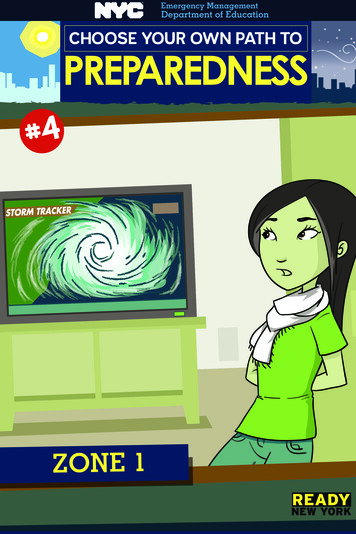

![Welcome [towerhealth ]](/img/38/chestnut-20hill-20patient-guide.jpg)
